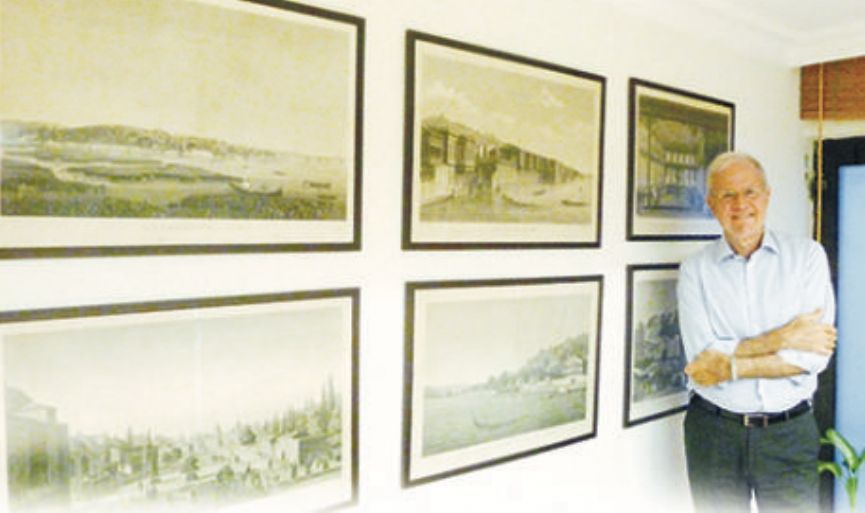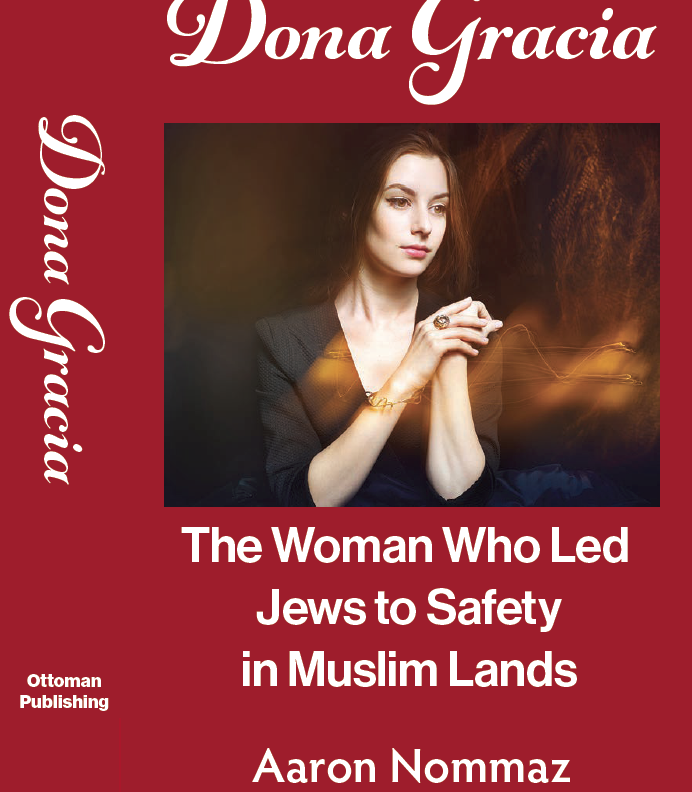
Talking and writing about our own history is our duty
With his book Kanunis Jewish Banker Dona Gracia, author Aaron Nommaz, left a mark in history and in the hearts of many people with the story of Dona Gracia Mendes, the mother of Sephardic Jews who is considered to be one of the most humane and altruistic people in the history of humanity. Aaron Nommaz blazed a trail with this book by depicting the life story of the richest woman in 16th century whose story have never been told in Turkish, before. We talked with Aaron Nommaz about his valuable book which can be considered as both a biography and a history book.
When did your interest in Dona Gracia, a Jewish heroine whose life story has been rarely written, begin?
My interest in Dona Gracia began 15 years ago. I read all the books written about her. My interest in the history of Sephardic and Ottoman Jews grew after reading these books. I fell in love with her personality and her life story. How could someone be such a humane person? At the age of 25, she wasn’t just the wealthiest woman in the world, she was the wealthiest person in the world. Such a rich woman could have done anything she liked; visit palaces, wear diamonds, live like a queen. Yet, she didn’t choose this kind of life. Instead, by helping her co-religionists she risked going to jail or even getting killed and spent all her fortune to save them from the Inquisition, find them a safe place to settle and ultimately a homeland. She risked her life multiple times. Saving Jews from injustice became a lifelong mission for her. Considering the dangers and fears Jews faced in the 16th century, what this woman did was unprecedented. There is not a similar story even in the Torah. She amazed me, I admired her.

How did you decide to write a book about Dona Gracia?
I first started thinking about asking a writer/historian to write a book on Dona Gracia, 5 years ago. I was frustrated by the fact that she wasn’t known by people. Even though she lived here, on these very lands and had such a significant influence on our Ottoman heritage, no books were written about her in Turkish. I asked my writer and historian friends to write a book about Dona Gracia. They all asked me to write it myself. I learned from my friend İlber Ortayli (a highly esteemed historian and writer in Turkey) that he had extensive knowledge and data about Dona Gracia yet thinking not many people would be interested in her story, he didn’t pursue the subject. Even though I was thinking to myself, “How can I write a book, I’m an engineer not a writer”, in the end I felt responsible. It is our duty to write about our own history. She is a very precious woman, she is our beloved grandmother. I myself am probably living here, on these lands, because of her. Also, I wanted younger people to read about her history and feel proud. The history of Judaism is a very special . Of course, that’s true if you know about it. If you don’t know your history, they’ll deform it. If other people decide on the quality of your identity, then you are in trouble.
Including the research phase, how long did this project take? What resources did you use?
The first phase of research took too long. It took at least three years. First, I read everything written about Dona Gracia. That was the easy part. I thought I would have found more resources here in Turkey compared to other countries since this is the place she spent the 16 last years of her life, but I couldn’t. There wasn’t much information about her in the state records. So, Prof. Aelion Brooks from Yale University kindly advise and oriented me. She is the number one source of information when it comes to Dona Gracia. Then I went to Boston University and worked with professors, there. Initially, I wrote a history book. I pitched this history book to publishing houses. Kabalci Publishing House loved the book, but since they regarded this book as a non-profitable project, I thought they would fail to recognize its true value. Then Destek Publishing House gave me the idea to turn this history book into a novel. Turning the book into a novel took me 6-7 months.
As far as I know, for this book you’ve worked with Prof. Dr. Halil Inalcik, a highly esteemed historian whom we lost two years ago. Could you tell us about this experience?
I did not directly work with Prof. Dr. Halil Inalcik for this book. I worked with him through his assistant of 20 years, Prof. Dr. Bulent Ari. After reading my book, Prof. Dr. Bulent Ari made some constructive remarks and took my history book to Prof. Dr. Halil Inalcik. Prof. Inalcik loved the book. Prof. Dr. Inalcik, a historian who assesses historic events within a social context, said that information about private sector in the Ottoman period is insufficient. Prof. Dr. Inalcik was a very valuable teacher. He was the teacher of teachers. We tried to build a foundation in his name, but unfortunately, we weren’t successful.
Could you summarize how Dona Gracia overcame all these challenges?
She was a woman who stood up against all rulers, all emperors. For instance, Queen Mary wanted Dona’a daughter to marry a rich aristocrat. At that period, there were two ways to take possession of one’s fortune. First was the inquisition and the second was marriage. But, Dona Gracia defied the Queen and rejected her offer. Frustrated, head of inquisition Don Francisco asked, “How can a Jewish woman reject the Queen?” and decided to chasten her. At those dangerous times, it would take great courage for a Jewish woman to act like that. She used her intelligence, planned incredible ploys which you could only see in movies and managed to escape. She didn’t only manage to escape herself, she managed to take her family and her whole fortune with her. Despite all the aggressions she faced, she continued to grow her fortune. Think of a woman who could ask Sultan Suleyman the Magnificent to write a letter to the King of France to pay the money he owed her. And, thanks to her close friendship with Hurrem Sultan, she ensured that Sultan Suleyman brought a large number of Jews living in Europe under perilous and life-threatening conditions to the Ottoman Empire.
The Pope acknowledged Sultan Suleyman as the protector of not only the Ottoman lands, but also the Jews due to his righteous and protective attitude towards them. How did Dona Gracia manage to do that?
Sultan Suleiman was a man who understood the importance of foreign capital investment and Dona Gracia was the wealthiest person in the world. Today, we are still talking about how important direct foreign investments are. Dona Gracia did not only bring her fortune to the Ottoman Empire, she also brought the technology its enemies were using. She was a pioneer in positioning the Ottoman Empire way ahead in its time with regards to commerce, banking and private enterprises. At those times, the most important thing was information, in other words intelligence. Money and land came second. Since Dona was familiar with palaces in Europe, she knew the mentality of those people. Since she was a banker, she had agents spread all over Europe. She was able to monitor the current developments as well as the movements of money. Also, all the rabbis in Europe knew about her supportive approach to the Jews and saw her as a their queen. That also made the synagogues important sources of information.
Dona Gracia and her nephew/son-in law Josef Nasi lead the famous Tiberian Project. What were their mission?
There were four important regions that were deemed holy by Jews living under the rule of Ottomans: Jerusalem, Saphed, Hebron and Tiberias. They couldn’t ask the Sultan to give them Jerusalem as it would be interpreted as a bad intention. Hebron was already within Jerusalem and in Saphed there was a Turkish military establishment used by Sultan Suleyman. That left them with the Tiberias option. At those times, Tiberias was a barren land swarmed with snakes. Josef Nasi asked Sultan Suleyman for permission to establish a semi-independent state in Tiberias. In other words, he wanted permission to establish a state system that would pay money/tax to the Ottoman Empire. They were spending huge sums to find a place for all Jews to live in peace. Of course, it was important to settle in a place where new arrivals will be able to earn their livelihood. The Mendes family was planting mulberry trees for silk trade. They were importing wool from Spain with plans to sew dresses like those worn in Venice. This continued until the launch of the Cyprus project. For this project, Sultan Selim II had promised Josef to make him the king of Cyprus. Josef was very excited. Since Dona Gracia had already died, Josef dedicated himself solely to this Cyprus project at the expense of Tiberias.
In 2010, at the 500th birth anniversary of Dona Gracia, there was a special event held in Israel dedicated to her. At the end of a 4-hour long symposium, Shimon Peres expressed how embarrassing it is that an important person such as Dona Gracia has been neglected for so long.
Do you have any other projects involving Dona Gracia in the near future?
First of all, I had two goals. The first one was to build a statue of Dona Gracia. I believe I’ve built a symbolic statue with this book. It was very important to me for people to learn about the relationship between Ottoman Empire and the Jews in the prime times of the Ottoman Empire. My second goal was to create a travelling exhibition in all countries Dona Gracia had lived. I made an appointment with the Portuguese Ambassador and the Portuguese Minister of Culture. I want to start the exhibition in Lisbon at the Turkish Embassy and then continue in Bristol, London, Antwerp, Venice, Ferrara, Istanbul, and Israel. This project would also act as a bridge of friendship between countries. Also, the La Sinyora Synagogue, a synagogue built by Dona Gracia in Haskoy, Istanbul can be turned into a museum and this way people visiting from all around the world could learn about Haskoy and the humanitarian of the
Another project I’m working on is Dona Gracia movie project. Since Dona Gracia lived on these lands for 16 years, a part of the movie will be filmed here. The project is going smoothly for now. I believe our community has a big responsibility to ensure that Dona Gracia gets the recognition she deserves. This can start by teaching young members of our community about Dona Gracia.
Who is Aaron Nommaz?
Born in Izmir, in 1945, Aaron Nommaz comes from a Sephardic family of Portuguese descent. At the age of 9, he moved to Istanbul with his family and at the age of 16 he went to the United Kingdom to study. After graduating from university in UK, he won a scholarship from US Berkeley University where he did a double major and had his master’s degree. Besides being a founding partner of a software tech company, he is also the Honorary Consul of Portugal since 1995. He is also the author of three books about the Mendes family one of which he translated into English and is being sold in Amazon.
Related News










